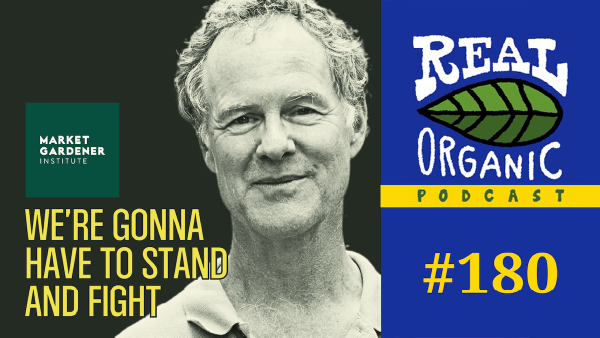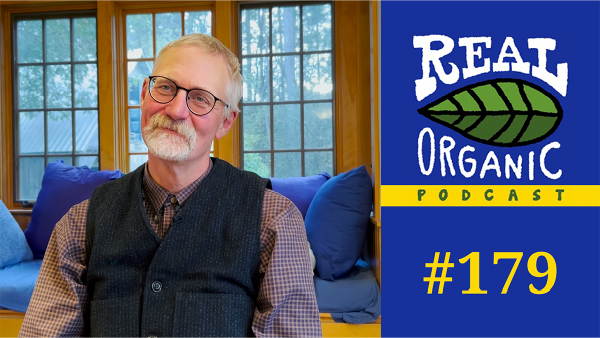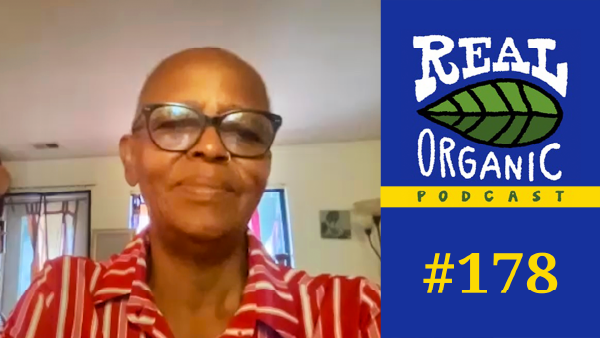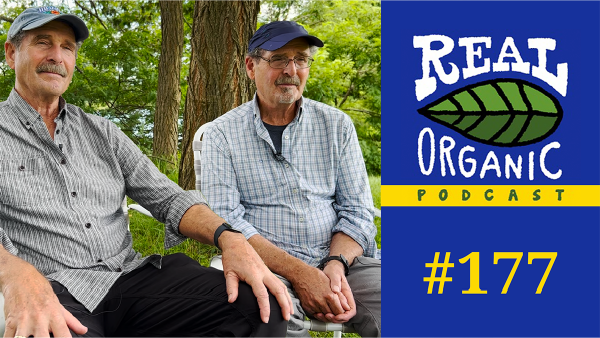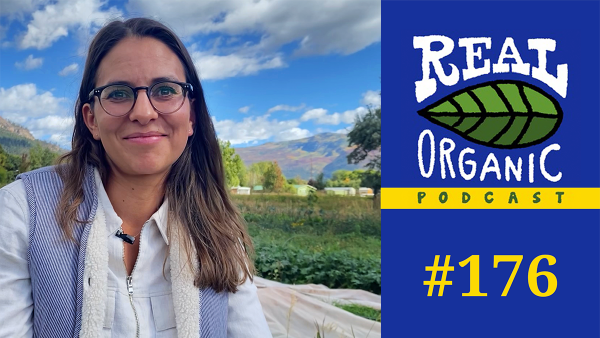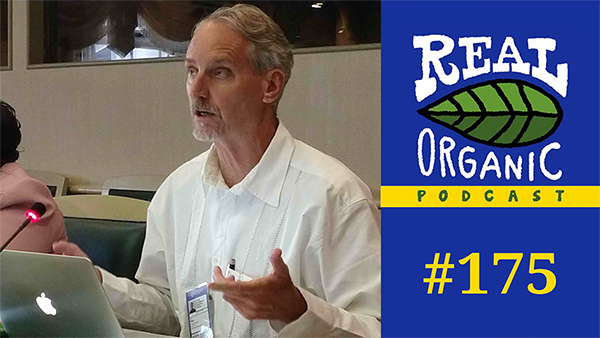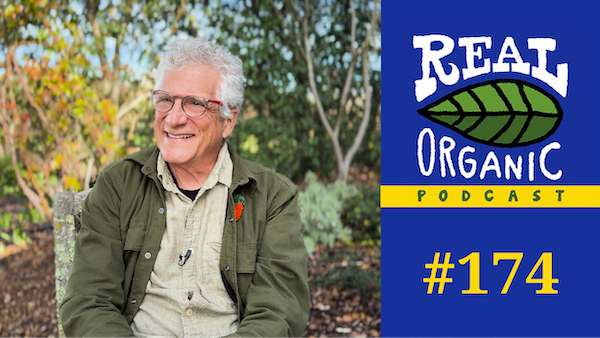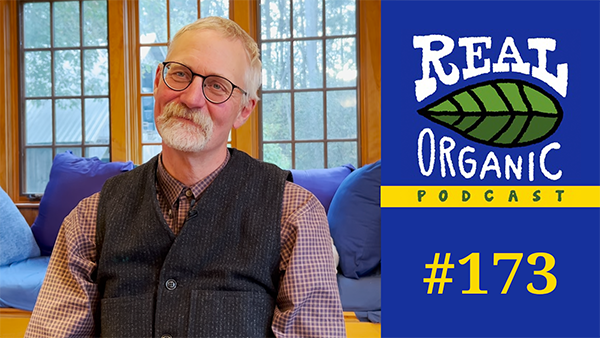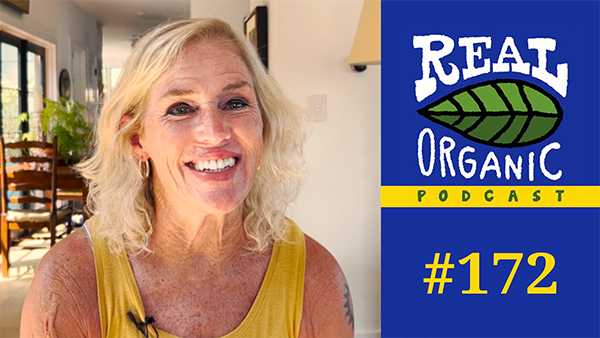Episode #165
Allan Savory: Desertification’s Causes, Problems + Solutions
Welcome! You can subscribe and download episodes of our show through your favorite podcast app.
You can also subscribe to receive the video version of each episode on our YouTube channel.
Our Allan Savory interview has been edited and condensed for clarity.
Dave Chapman interviews Allan Savory, March 6, 2024:
Dave Chapman 0:00
Welcome to The Real Organic podcast. I am privileged to be having a conversation with Allan Savory today. Welcome, Allan.
Allan Savory 0:08
Thank you.
Dave Chapman 0:10
Um, you know, this conversation came because you responded to a letter we sent out and you said, you agreed with everything in the letter, but shouldn’t we address the causes of some of the problems to try and get to the solutions? And I know this is something that you’ve been seriously working on for many years. And great, let’s, let’s do that. I want to start a little bit by just talking about the problem. And then we can talk about, about getting towards solutions, which are the hardest things to find. But I think many, many people still don’t understand the problem. So that’s important, too, to know, what you’re dealing with. You You propose a conversation. And so we’ll we’ll see how that goes. You know,
Allan Savory 1:04
I like that, Dave, that to have a conversation rather than just questioning me on one side. Great. And yes, let’s let’s start with what the problem is. You say? Most people don’t understand that? Well, my own feeling is I think they understand that where the lack of understanding is in the course of the problem. And that, and I think it’s a general acknowledged fact that if you don’t address the cause of a problem, you will never ever solve it. Yes. So let’s start from that point and, and outline, what is the problem? What do you think the problem is?
Dave Chapman 1:49
Well, I guess for me, I see I see a world a little bit going off the tracks. The obvious problem that we face is, is Climate Change. And, and as you say, desertification, I’ll say it’s interesting as somebody who lives in Fremont of the United States, that desertification is something that mostly I read about rather than experience. And I realized that this is true for most of the world, about the only place I experience it is when I go to California. And they have certainly been getting consistently hotter and drier and browner. And they’re aware of that problem now. Yeah. So I will just say that, for me tied into this is I think of the problem of a disintegrating food system. And, and it’s connected to the things that you say, but it’s also connected to a concentration of power in the food system that makes the kind of sane democratic problem solving that that you’re promoting hard to reach.
Allan Savory 3:06
Hang on a sec there, because you’re going into causes now.
Dave Chapman 3:09
Okay,
Allan Savory 3:10
let’s just clarify the problem. I appreciate what you said there. And particularly that you don’t see desertification as a major part of what’s happening because of where you live. And that is true of where most of the western universities are. And most of the environmentalists are the cities. Also, they’re unaware of a major part of the problem. The problem as I see it, and began to hear nearly 70 years ago, is that we are and now we’ve got the words for it. We didn’t have the buzzwords 70 years ago, what I was seeing was what is now seen as global loss of biodiversity. A symptom of that, in about two thirds of the world’s land, but not where you live, is that it turns to desert. Desert vacation is an unfortunate word for a symptom of the loss of biodiversity in seasonal rainfall environments for the world, particularly if they’re low rainfall also. So where you live in the world is different from where I live it and worked much of my life in the world. Right. So you will get humidity throughout most of the year at a reasonable level. And it is increasingly difficult in those environments to create bare soil, millions of acres of bare soil between plants, where I live half of the year, we will get rainfall over four, five months if we’re lucky. This year, we’ve only had eight inches 400 millimeters, and it’s over now, four For the next nine months at least, and we get no more rain, if we do get to cause damage, because it’s falling way out of season. So these are very different environments. So if we’re all in this boat together, we’ve got to look at it globally all the time, no state or country can be an island unto itself. So the problem, as I see it, is global loss of biodiversity, leading to desertification. And with that, increasing mega fires, fires, burning at altitudes and latitudes, we’ve never known them before, and with great ferocity, right, and these three are fueling Climate Change. Right. So that is the major problem. So let’s call it Climate Change, as most people are today. Now with that there are many underlying symptoms, poor land leads to poverty leads to social breakdown, leads to violence war, which I grew up within was a major part of helping solve this, find a way to solve this problem. So we’ll leave those aside at the moment. But the mass emigration you’re seeing to Europe, the mass emigration you’re seeing into United States, causing such disruption now, the mass loss of confidence in government agencies, etc, you’re seeing all over the world. But particularly in the United States, right now, these are all symptoms of exactly the same thing, which is the way that policies are developed. So, now we become coming towards core. So let’s, we seem to be agreed on on me what the problem is, and let’s just for ease, cause it call it biodiversity loss, desertification, Climate Change, now,
Dave Chapman 6:58
and could I throw in? Alan, it’s interesting to me that, that until fairly recently, many people in North America have felt the problem was so distant, that it wasn’t their problem. You know, it’s, I’m sorry, for the people who are hungry and live in these desperate places in these eroding environments. But it’s, it’s only a something in my head, I don’t see it. And I think that’s changing now. Well,
Allan Savory 7:32
it’s not changing Well, enough, yet. An example of that I have reduced because I’m dealing with people in the UK. And I’ve been trying to deal with the Royal Society in various organizations there and promoting things as the solution. Right? Which are, bear no relationship to the problem, really, or very little relationship model. And no, it means a solution, not addressing the cause. And they don’t realize they’re actually doing damage to most of the world. Because what they’re proposing as solutions, alright. Aren’t and if you wipe the whole of the UK, which is perennially humid environment, virtually, if you wipe the whole of that off the map, that would hardly make any difference, because the whole of the UK is the only the size of one island off the coast of Africa, Madagascar, and Madagascar is desert, fine. So if you just took Madagascar in the UK, you know, see, they’re about the same size. But the UK has immense influence in the world through its universities. Its role politically, militarily every way policy aid, and it’s doing enormous damage, as is USAID, most reviewers say it is geared on the thinking of Washington. That’s a humid area.
Dave Chapman 8:58
ALLEN Well, what what would be some of the thinking that is tragically wrong in terms of solutions? It’s coming from the UK or the US what, what are the beliefs that oh, if we do this and this, they’ll come we’ll be positive.
Allan Savory 9:14
Okay. Well, let’s, let’s get right to that. In other words, you’re asking, what is the belief as to what’s causing this problem? That’s what you’re really asking me? So let me start with you. I’m going to answer it. What do you think the causes of biodiversity loss, global Climate Change fueling global desertification, fueling Climate Change?
Dave Chapman 9:46
I’ve thought a lot about that in the last two days because I’ve been preparing for this conversation. And I’ve been listening to your talk a lot. And so I can I can say that I’m convinced that the impact of the drylands in the world is enormous in terms of climate. And
Allan Savory 10:11
what is the cause? What is the cost to that?
Dave Chapman 10:14
Okay, I wanted to ask you that, but,
Allan Savory 10:16
you know, I’m going to answer it. Yeah. Before I give a lecture. You know, this is a discussion, I want to hear what you think the causes, talk about what the whole world thinks of causes. And then I’ll say what I think the causes.
Dave Chapman 10:34
Well, you won’t like this one, but part of me thinks that it’s, it’s that there’s too many of us too many people to have a population. And so the the land is not? Well, it’s responding as it does for overpopulation of species by having the population crash when there’s too much pressure on an ecosystem. So overpopulation
Allan Savory 10:58
is one thing causing what else?
Dave Chapman 11:02
I think that the economic system favors a kind of production that makes money rather than food. Okay, and I’m interested in money for a small number of people rather than a large number of people. So I think the economic system constantly is pushing us to stop growing food for people in the area and start growing some commodity that can be pushed somewhere else. And and those problems that creates are out of sight of the people who are buying those commodities, your
Allan Savory 11:36
data that you don’t need to explain them all. Just say what do you think’s overpopulation? financial system economy, driving wrong things. Yes. Whatever. Yes. You think fossil fuels are playing a role? Yes,
Dave Chapman 11:54
yes. Yes, of course they are. It’s box,
Allan Savory 11:59
livestock.
Dave Chapman 12:02
My experience of livestock primarily is that the confinement and intensive case intensification of livestock is definitely causing the problem in my belief.
Allan Savory 12:14
Okay. All right. So intensification and refinement of livestock, what? So you’ve known these, what is the few of society, all the institutions in the world, the US National Academy of Sciences, the Royal Society to the oldest scientific bodies? What is their belief? That is what is causing this?
Dave Chapman 12:42
I believe that they’re primarily focused on fossil fuels.
Allan Savory 12:46
Correct. Primarily fossil fuels, and secondary livestock
Dave Chapman 12:50
and secondary livestock. And I’m not a scholar of this, Alan, but my guess is that, yes, they would say, over grazing,
Allan Savory 13:03
yeah, over grazed. It’s been blamed for over 10,000 years. And they endorsed that. Right, and served as the anti meat movement, and they deal with mumbos of the world and, and people like that. Right. So let’s leave it at that. Because I think we’ve covered that, whether it’s yourself who’s one of the, in my opinion, I’m not just flattering you because I want you to buy me a beer. I think you’re one of the clearest thinkers I’ve come across in the whole agricultural movement. Right, so we see what you think it is, see what the world thinks it is. Now, recently, we had acknowledgment from virtually all the world’s sign scientists, that these are not the cause. And that was unwittingly acknowledged. And the media has missed it. Institutions have missed it. Everybody’s missed it. So what am I saying that? I’m saying what I said a cop 26, two years ago, that we’ve had 10,000 years of blaming livestock for causing the deserts. You’ve got back in ancient texts and see them blaming the sheep for causing the desert cetera, destroying cities 1000s of years ago. And that has morphed into scientific fact, even though there’s no science to support it only belief. Right? So that’s been there for a long time. We’ve had denials that we were causing Climate Change, and we’ve had people predict saying it and people denying it. But I think we can say in the last three or four years that every sane scientist has admitted or acknowledged that humans one way or another are causing Climate Change. Now that acknowledgement is profound because Science is logical. And if we are logical, if humans are causing it, then fossil fuels cannot be causing it and livestock cannot because it gets, because you can’t have two causes of his own problem. So now, what are we looking at here? What scientists are acknowledging, unwittingly and accepting that we are causing Climate Change is that we are doing it, which means through management, it is how we manage fossil fuels. It is how we manage livestock. It is how we manage resources, that is causing all the problems you and I began discussing everyone. So, all of these now, suddenly from a plethora of confusing issues around the world, but you see a DevOps, STG got a goal settings and conferences on what climate all of these confusing issues are now coming down to management. That’s the only course it is how humans are managing resources. Okay, that’s what Now that’s what I believe. And no scientist in the world has corrected me on that. I said that two years ago, I had many, many people on social media, acknowledge it shared, etc. I didn’t have one single criticism. But nobody acted. We just say hold on. So I think that’s where we need to focus. Now. That question of management, right? Is what, and I’m not a wise man, I’m just an ordinary person. But that’s what I accidentally hit on when I was 20 year old and joined the colonial service and started observing biodiversity loss, severe biodiversity loss in wild areas of Africa, that we were setting aside and managing professionally as future national parks. Now, think of the things we blame and you blame things like overpopulation, etc. Today, as we are talking, some of the worst cases of loss of biodiversity desertification are in national parks in the United States, in New Mexico, in Colorado, Arizona, southern parts of California, in Africa, where I live now, these are national parks, that are being re wilded. The decades ago as people in the UK are calling for. Now, how can they be out some of our worst cases of biodiversity loss, eroding soils collapsing, riverbanks, species disappearing? Plants, animals, insects, reptiles, all disappearing? We cannot blame overpopulation there is no population. We cannot blame. Poaching. Poaching doesn’t cause habitat destruction. We cannot blame hunting. We cannot blame fossil fuels. We cannot blame politics. We cannot blame colonialism. We cannot blame blame slavery. I’m just mentioning all the things I’ve heard people blaming you. We cannot blame corporate misbehavior. I don’t know if I said that one. We can go on and on and on. There is nothing nothing left to attribute us to, but by management by professional, highly trained people.
Dave Chapman 18:59
And, and in that you would include doing nothing as a form of management.
Allan Savory 19:04
Yes, that’s called rewilding is by some people, rest by others. It’s a it’s a possible action, or tool humans can take that I used to teach people 4050 years ago. And it’s one of the three things that humans could do. And that began, as far as we know, about 10,000 years ago. It probably began with Pastoralists or with farmers, pastoralists, moving their stock to let the land recover. Or farmers rotating their crops to let the land and the biodiversity recover is probably where it started. We don’t know that for certain, but it’s a reasonable guess, but it started 1000s of years ago. Now. The it when we manage we have to use some tool to manage John environment and I said just now three things. The belief in the world which I, with the help of 1000s of people discovered this room in by 1984 is that we have many, many tools, well, we actually don’t wear it to using animal. And you and I, and everybody listened to us cannot even drink milk, unless they go to a cow and suck with a mouth. And they say is technology, your cup or mug or pot, something, you can’t even drink water without going to the North River drinking enough. And as US technology, we can do nothing with all the money in the world, we can do nothing with all the creativity in the world, until we pick up a tool. Now humans, scientists, etc. only have three tools. Two of those tools cause desertification lead to it. The third tool, even in science fiction can control it. Yeah, we discovered that 1984. Now, how did we discover that I was commissioned by a branch of USDA, the Soil Conservation Service, to put 2000 academics and professional people through training from all the main government agencies and land grant colleges. Now, if I had told this large sample of 2000, people trained at various branches of science and management, that we only had three tools that would have been ridiculed, they would never have believed it. So I didn’t tell them that I let them discover it. And it was very simple. I just said to them, I don’t care what university have gone to, I don’t care what PhDs you have, what field you studied in, I want you to just list every tool you’ve ever been trained to use to influence our environment. And by the way, while you’re doing it, also list any of you you’ve used it in your private life. So they did that. And we got 1000s of things written down by 2000 people. And then we broke them down into casual categories, and they were fire resting the land, or technology. Now, fire, over two thirds of the world slant leads to desertification. Rescuing land, over two thirds of the world leads to desertification. And no technology even imaginable in science fiction, can replace rapid biological decay in annually dying billions of tons of vegetation can replace gradual oxidation of that with rapid biological decay, which is what we have to do. That’s why national parks and everything else and research plots in the United States are turning to desert.
Dave Chapman 23:14
So Alan, I, you’ve explained this, but it’s important to just call out and let’s let’s let’s have you explain it again. Why is it that resting the land leads to desertification? And if I can throw in here, I believe that you’re talking about resting the land in dry land areas, not in Vermont. Am I right about that?
Allan Savory 23:38
Absolutely. If we take resting the land, right and letting nature recover itself, it is off the three tools we have it is the most powerful to restore biodiversity, in Vermont, in the UK, in France, etc. Anywhere in the world in Brazilian tropical forests, anywhere in the world where it’s almost perennially humid, we have no more powerful tool than resting the land to vet recover. In the oceans of the world. We have no more powerful tool than resting environment, because it’s perennially humid. Now, when you come to two thirds, roughly, of the world, which I showed in NASA shots from space, in the TED Talk, that went to about 9 million people, right, when I’d show up there is that when you look at most of the world, right across North Africa, and Madagascar, right up into Costa India, up into China, when you look at that area, far bigger than the United States, bigger than Australia, but ever. That’s where the world’s desertification is that it’s worse. Now there if you risk the environment and take care So if the rainfall is 300 millimeters or less, right, what happens is that grass, not trees, which provide the main cover for soil. They grow every year. And they die every year. But they co evolved with herbivores. Now, if you’ve removed most of the herbivores as you do, even on research plots in America as they did, if you remove them, what happens to that grass? And the answer is it grows. And then it dies. So, where I live over four months, it grows, it grows 678 10 feet time, over four or five months, now the rain stops. Now we’ve got eight months of no rain. Now what happens above ground above the grazing height of animals where its growth points are for protection, they’re low, they’re not appear. Above that, everything dies. But it stands in sunlight. It doesn’t decay, it starts to chemically break down and oxidize, you see this on the dark, black roof hatch of the outside of the thatch, look on the inside of the thatch in my home, it’s yellow, looks the same colors the day it died, look on the outside where it’s in sunlight, and it’s black. And it takes 3040 50 years to break down. Now that when the growth points of perennial grasses are at the ground level, and I’m giving a very much summarized version that leads it killing the grass. And you get back round. And I showed pictures of that in the TED talk. And I showed research plots, Michoacan cetera. So without we’ve known that since 1960s, without
Dave Chapman 26:54
the grassland being grazed by herbivores on an ongoing basis, that grass actually leads to the death of grass. So it leads to killing itself primitive leads to killing itself because it, it was never evolved. To grow to eight feet tall, and then go through that dry season.
Allan Savory 27:18
All life developed together from the beginning of life. And that’s why I began to have difficulty even at university being taught plant ecology and animal ecology, because to me, It’s oddly distinguishable. What’s a plant, and what’s an animal as you go down in the life forms, and I couldn’t conceive of any such thing as plant ecology. And more recently, and I’ve even seen textbooks written on fire ecology, well, that’s like writing a change or ecology of Fire is a tool, it’s an ecology is a branch of science. So you can’t have a change of ecology textbook, I mean, or a fire textbook. So so this misunderstanding is very deep, it’s easy to see why people didn’t understand it. That that whole life developed together. In every different part of the world, it was the same, they will develop together when you look at the deepest oceans that if 5000 feet under the water with no light ever reaches and the life is, appears to be energy based from chemistry, they still find that they develop together when you come to the top and surface and the biosphere, all the oxygen in the biosphere that makes life in the oceans and on land possible for the fish to breathe us to breathe. That all came from plant and animal life biodiversity. So, you know, that, unfortunately, that branch of science has, has suffered very, very badly, from the better minds in the world, being attracted to the hard sciences, physics, chemistry, etc, by as, I think an unintended consequence of Nobel prizes from two years ago, attracting our better minds there. And inferior Minds Like Mine went into ecology because we loved wildlife, or something like that. Not because we were seeking recognition and awards and Nobel Prizes. There was no Nobel Prize for ecology, and yet it’s the most vital branch of science for the survival of humanity. Yes,
Dave Chapman 29:36
yes. And a fairly new science. But
Allan Savory 29:41
it was the new one of the newer ones. It only began just when I was an infant revenue. Although Alexander Humboldt had really foreshadowed a lot of it over a century before.
Dave Chapman 29:54
Yeah, so just for a minute to go to grasp because I still think it’s important that this distinction when when the grass in a dry land grows up, and no animal eats, and then the way it’s broken down is through chemical reaction, which you call oxidation. But it is oxidation. Yes. And it’s it’s either slow oxidation or rapid oxidation. Rapid Fire
Allan Savory 30:21
Fire is rapid oxidation. It’s great. Yeah, that’s right. So I, I called that in my textbook. And when I began training professional people, I called that brutal environments of the world I, I use the word brittle, because any farmer, any anybody, you can go do this. If you’re in the humid environments of the world, and you can pick dead grass that’s totally dead, or dead twigs, or fir tree or dead leaves. You can crumple them up softly, like tissue paper almost in your hand, there is no sound. It doesn’t crinkle and crackle. Now, if you go to the environments, like New Mexico, big chunks of Texas, Arabic, South America, Australia, most of Australia, etc, where I live, if you get a dead twig, dead leaves of trees, that cross that’s been dead for six months or more, and you crumpled it up in your hand, it doesn’t just crumble, it crackles and breaks into little fragments, and you can hear it breaking up. So I use the brittle because it’s brittle to describe it. So. So it’s in those environments of the world that are the greatest parts by far of the Earth’s land. I mean, those areas are far far larger than the whole of the Brazilian tropical forest and people are so concerned about
Dave Chapman 31:47
Allen has that growth, has there been a growth of those brittle lands in the last 10,000 years? No,
Allan Savory 31:55
No, the brittle lands stayed about the same, they will only change as humidity changes gradually, so some of them will become more brittle, as rainfall becomes less effective, but essentially they’re where rainfall was seasonal. Now, as the desertification gets worse, yes, they will get a lot worse. But brittle land isn’t expanding. The desertification of the brittle lands is expanding, and to the fringes of etc. Now that concept of effective rainfall is something that came into my mind in the 1961 period, roughly. I was in charge of all research in wildlife in the whole of my country at that time. And we had a terrible drought in the area where South Africa, Rhodesia, and Botswana joined the headwaters of the Limpopo River. About 50,000 head of game died, in that, almost all cattle had died. And we were collecting money, International Red Cross was for the flood victims in Mozambique. At the same time, now, it logically when you look at that you had the headwaters of the river, the three countries and the river flowed down to Mozambique on the Atlantic, on the Indian Ocean coast. And their floods were our drought. And that didn’t make sense to me. Science is logical, so I start posing the question: Why the hell is this happening? And that’s when I came up with the concept of effective and non effective rainfall. When you have these brittle environments functioning well, which can only happen with livestock. It can’t happen with just fire and technology, that’s totally impossible. So when you get the livestock handling correct in those areas, the rainfall becomes more effective. And we’ve got a lovely example of that on the land where I live in Zimbabwe. We’ve gone through twenty, twent-one years now of bad rainfall, adverse rainfall – this year, extremely bad, about two, three years ago was the lowest we’d ever had til then. And despite that, and despite all the published figures, from institutions saying cattle use years thousands of gallons of water to produce, our cattle have produced water. We’ve now got open water, geese breeding, fish, water lilies, where we have no record of water in the past century. That’s entirely produced by the behavior of the cattle and management of the cattle, making the rainfall that falls soak into the soil and stay there, and only come out of the soil by transpiration through plants. ants over, running through the soil to provide wetlands, rivers, underground water. Now a non effective rainfall which we have over most of the world’s land, now it is brittle. There what you find is the rainfall that falls, the majority of it runs across the soil to give you floods, and landslides, and all the stuff California is experiencing, etc. and what we were experiencing here in 1961 in Africa gives you that and what rain does soak soak into the soil because some always does, what rain soaks in, now leaves the soil mostly straight out of the soil by evaporation by drying your hair with a hairdryer. So very little rain is becomes effective in that it grows plants, or goes to underground water, and so on. So you’ll find rivers beginning to that used to be perennial, becoming just flooded rivers and so on. Alright,
Dave Chapman 36:03
I’m going to ask you a question. But first, can you tip your computer screen slightly towards you? Thank you, so they won’t yell at me later. Okay, so I have a question you have a generosity that I sometimes lack, which is that you look at people who have made serious mistakes and like you and me, we have both made a lot of mistakes in our lives. And you look at people whose mistakes have led to pretty devastating consequences. You talk about the the the many people who were herders of animals, and their actions accumulated over centuries, led to the devastation of the cultures that they lived in. And, and still happens, you don’t you don’t blame the you don’t call them bad people. But you say, and let’s put it in the language that we’ve been talking about that that they have made management management mistakes. And if they had managed the same resources differently, they would have had much better outcomes. Did I get that right? Yes,
Allan Savory 37:17
absolutely. I try my best, earlier egos, sometimes criticized individuals, I think you’ll find if you look at all my stuff, textbooks, if you look at my podcasts and everything else, I don’t think you’ll find me learning any individuals. Because who do you blame for not flying the whole, the Wright brothers did. Somebody had to pick a plane? Nobody was until we discovered what was causing Climate Change, as we agreed to call it in 8419 94. Until we discovered that, and a way in which we could remedy it. That was totally unknown. That was like flying, we didn’t know how to fly. So nobody has to blame. What I do blame at times it is the behavior of institutions, because they have blocked that knowledge or training was banned. Southern Africa was banned from even setting foot on any university campus for over 20 years. That institutional behavior and blaming the institutions, not the people in them. The people in them are good people, that wonderful people that close friends, mind they that’s how institutions behave. So when we get to discussing how we might solve this, I think you’ll find that the people I’m working with in the Savory Institute, etc. As far as I know. And I could be wrong on this. But if I am, I forgot to check if somebody told me. As far as I know, we’re the only people in the world that are not blaming. And I’m not saying we have the solution, and are saying we all have to pull together unite to solve these problems. And all we have, which we literally, I said we because 1000s of people were working with me, discovered in 1984. And that is a way in which we can jointly solve these problems and reverse biodiversity loss desertification, as we’ve demonstrated repeatedly now for 50 years. Yeah, yeah. And if institutions block that ranching organizations, farming organizations, or organizations virtually, I don’t know any that support that they pocket, that is institutional behavior. And it’s one of the things that we have to deal with, in coming together to solve the problem. Why?
Dave Chapman 39:52
Why do you think that those institutions are so afraid of thinking differently, and trying for what are obvious his problems whether whatever the solutions might be, obviously, their problems, why? Why are they so reluctant to change?
Allan Savory 40:11
It’s because of the behavior. And this we’ve learned historically, we’ve learned through system science, and what are called wicked problems, human organizations, and they’re the only way we can manage at scale, when we form them, to take on a life of their own. And no human organization is actually a human. And no human organization behaves like a human. So once we form our organizations, and we can have the most perfect people in the world, in them, that doesn’t matter. They’ve ceased to be people are now an organization. Now organizations take on a life of their own. They defend the beliefs of society in which they are formed. And they have what are called wicked problems, which means they’re almost impossible to solve. Now, a wicked problem, an example, but not of organizations, would be desertification that took us 10,000 years to solve, and resolve that in 1960s. But then institutions blocked the knowledge. That’s where their institutions behavior comes in. That’s why institutions banned me from lecturing for universities. That’s why institutions in America tried to get knee deep bought it for the damage I was doing to America, etc. So this is not people being bad. This is how institutions behave. Now, many people have difficulty understanding that, understandably, because academics do that research, they publish that stuff, and then nobody does anything with it. Except independent scientists like me that pick it up, and relate it to what’s happening in history, what our own experiences, etc, not to give you an illustration of why I would never blame any individual for that. Let me just take one area of our lives religion. And I’ll just have the menu of religions, I’ve just looked at one Christianity, because many people who are listening to us will be Christians. Now, the message of the founder was incredibly simple. Basically, we could sum it up is love and caring. And for 2000 years, many millions and millions of people have been capable in their families, in their communities of love and caring. And we see this over and over again, in hard times the poor give more than the rich, the rich, give less, etc. We see this from, from people just pulling together in or in hardship, whatever, every time is a disaster, people pull together, help each other Christianity begins to function. Now, what happened when we managed to fit scale? We found that we developed well over 2000 branches of Christianity. And for nearly 2000 years, I think it is now they’ve been torturing each other, killing each other, going to war, protecting pedophile priests in the church are not the innocent children. None of that is Christianity. But that’s how Christian organizations operate. And I’m not going to talk about the other religions, but you’ll find essentially, same, it’s so it’s, it’s not bad people. And the institutions that blocked all I’m saying, it was individuals within those institutions that work with me, in their capacity as citizens as concerned people, as scientists, but outside the beliefs of the institution, and the behavior of the institution. So we have to attend to that problem. And nobody is even talking about it at any global conferences.
Dave Chapman 44:00
Alan, would you would you say that? The problems, the challenges of institutions become greater as they become larger?
Allan Savory 44:13
Oh, yes, the larger they become, the more lateral inclined. And the older they are, the more established their own set ready are they tend to be worse, but it can it’s happened to me twice. I’ve myself have developed organizations, and both of them ended up totally destroying me, throwing me out of this the organization’s and going on to fail. Yeah. So you know, I’ve experienced as well. And we’re very aware of that in the Savory Institute because we’re an institution and reformed but so we’re terribly aware of that. And under very good leadership of young people, they’re doing an amazing job. But I cannot tell you how much time we attend to our own behavior as an insult. Yeah, yeah. Yeah. So okay, going on with our discussion. You know, if we look at the go back to the cause of the problem, I said it was management. And I think every scientist now unwittingly acknowledges that. So I think that’s where we need to focus. And that raises the question of what level of management because we’re demanding world leaders take action. Now, as I see it, and please correct me, there’s two basic levels, what I call the human level, that’s you and I, and everybody listening at everybody in every institution, managing their own family, their own life, people in their community, maybe a small side business, whatever. That’s the human level of management. And then the moment we take it to scale, agriculture, immigration, finance, anything, even religion, that moment we take it to scale, we can only manage through an institution, or organization. So that is where we’ve gotten a look at the management. Now, when you if you were to say to a world leader, the governor of any state or whatever, this is what we need to attend to. Again, that’s, that seems impossible. There’s too much that’s that how can I attend to this behavior of institutions, management of everything? In agricultural policy? I’ll just pick one. The answer is no, we can distill it down better. So what I did in the cop, 26 talk or to anybody can look at it’s 12 minutes very short, is I said, let’s look at what we manage, and what we don’t manage. And everything that we make or produce, we do not manage we make or produce it. Now, that comes down to almost everything that your members are doing. They’re producing food, whether it’s meat, cheese, milk, wine, I don’t care, they are producing food, they’re not managing it, they’re producing it, if they stopped producing, if it stops, they can choose to produce cheese, or wine, grain, or what potatoes or whatever, right, you’re gonna make independent choices. So that’s not where the problem lies, with the millions of millions of things humans produce, from music, to bombs, to computers, to buildings, to roads, to vehicles, to planes to food. So where is the problem life management department? Well, it lies in the three things you manage. And I mentioned, we only had three tools and why we have to consider including livestock as a tool. I mentioned that. But now what about the things we manage? What humans manage is ourselves. We don’t produce, we manage our families. Right? We manage economies, because we’ve got to finance our families. And we manage our environment or nature to produce everything. Bombs, planes, computers, food. So you’re managing three things. Now, at scale. You can only do threat through institutions, scale, agriculture, anything, you manage institutions, and they finance themselves, at row etc. As institutions. And through those, you manage nature, to produce food, or whatever. So you’re managing these three things. Now, you cannot choose to manage your family or an institution independent of the economy. You can’t choose, you have to manage them together. Now, when you’re managing your family, and the economy or the institution and financing institution, now you’re going to manage nature to produce food, or produce everything. You cannot choose. To ignore the economy and manage nature. ignore your family, just look at the economy and nature. You have to manage the three in separately together. And that’s what we discovered a way to do in 1984. So there isn’t a solution. There isn’t a silver bullet. All these organizations promoting solutions in regenerative agriculture, in normal agriculture, immigration in COVID or whatever you like. All these people promoting solutions are not what they do is promoting their way of producing something. So in Europe is saying what we’re saying is, as a segment shift is why don’t we just get together? And what we have developed with lots of people is a way for us to work together. So jointly, we develop real solutions.
Dave Chapman 50:27
And and what you’re describing is what you would call a holistic approach. Because it’s yes, no, no. Okay? No,
Allan Savory 50:37
I’m not because we would be arrogant. If we thought we were the first in the history of the world to take an holistic approach or think I was totally, there’s your lots of evidence that past civilizations way back 1000s of years ago, thought poor holistically than we do today, saw their connection to the environment more than we did today. This drawing about Native Americans thinking seven generations ahead, as they manage rivers and whatever resources so that this ecological ignorance is more a thing of universities isn’t modern science, the Western world than ancient societies, so that those ancient societies made decisions, exactly like we did today. And where they didn’t have laws and regulations, I had two booths, which were their equivalent, but they develop those exactly as we did today. And that’s what we discovered in 1984. Is humans have always made management decisions in the exact same way. Okay, so what we have to do is not take a holistic approach, that won’t help us, what we have to do is to actually manage risk. Okay, that’s very different.
Dave Chapman 52:01
And to you, managing holistically would be bringing together those three legs
Allan Savory 52:08
yesterday, how, how do we do it is the issue. And yeah, we are getting into deep, stormy water and difficulty for me, because I’m going to use the analogy of a bicycle. If you and everybody listening had never known of a bicycle, and you are now asking me and saying, Okay, I get it, we can use a bicycle to go much faster, much more energy efficient. But for God’s sake, this thing just has too little ties. It just balances Adam levers, explained it to me. So the more I explained to you, a bicycle, and how it works, the more confusing it would become. Now, if you and I had a bicycle between us, within 20 minutes, you’d be riding it. So what I’m talking about is 100% Practical management. I’m not talking about science, research, that all needs to be reductionist, it’s essential. Management cannot be reductionist, but it is. So So what if we got together and just work together? Like riding the bicycle, you’d learn it very quickly. I hate to actually teach Holistic Management these days, I’d much prefer to just work with somebody, get them doing it. And they always just say, Oh, my God, this is common sense. So what do we actually do is rarely, we use a new concept. So we try expanding that. One of the things that happened to humans is we always assumed we were bettering our lives by management deficit, assumption, that’s why alter using animals start to try to better their lives. Now, when we did that, we were always making decisions to achieve a need or desire or to solve a problem and conscious decisions by humans, I would say 99 point something percent fall into those three categories. You cannot take the complexity of human society, culture, and all our different languages and cultures, institutions and their wicked problems, the complexity of economy and the complexity of nature, which is mind boggling, which have to be managed together and reduce that in a policy and agricultural policy or decision on the farm or ranch to meeting a need or desire or solving a problem. Humans have tried to do that for 500,000 years or So what we discovered in 1984, was that we realized, in effect, but easier to see, in hindsight, we realized, Oh, my goodness, what we need to do is have something, a context for our decisions. Because what the moment, the reason for the decision, and the context for the decision are identical. So what we need to do is to acknowledge that we will never change the reason for our decisions. I think for as long as humans exist, we will make decisions to meet our needs, or desires or resolve problems. So let’s not change that. Don’t try, what we’ll do is, and this was the most difficult thing to develop, and why it took so long in learning how to manage realistically, we needed a concept of, of a context for management that brought together a complexity of humans, economy, and nature. And they had to be brought together. And we finally got that. And then I wrote the textbook after that, in 1984, with the help of a lot of people. Now in that concept of a holistic concept, we can form it at a national level, or state level, or corporate level, family level, person boogie down doesn’t matter. So universal. When we do that, we get the right people at the table who have to do it. Otherwise, you’re not going to work because people are going to pose and so on. But we get the right people at the table. And they just start regardless of the problems regardless of everything. And just start by saying how do we want our lives to be met? Just answering that question? Very deeply. And simple guidelines. 100%, how you want your life to be 0%? How to do it, that’s a decision already made, can’t be in the context for a decision. And when we’ve established how we want our lives to be in our particular culture, or whatever, our particular family, whatever. Alright, the next thing we do is we so right now, how do we want our environment to be a life supporting environment? If you cannot escape every human is 1,000% Depends on habitat, and oxygen coming from biodiversity? How is that going to have to be? Not how do we want it to be? How’s it going to have to be three 400 years from now, for our descendants, descendants to live a life like that. And then we describe that in terms of four processes, how rainfalls effective or not how solar energy flows through biological life, our nutrient cycle, in the oceans of the land, etc. So we essentially describe it like that. And then there’s a final piece, if we want to live lives like this, in an environment like that in the future, how are we going to have to behave? Because at the end of the day, every person and institution is judged, not by the marketing, not by the mission statements, not by the visions, you’re judged by your behavior, to how you’re going to have to behave. And these three things going together, give us what we call a holistic context. Now, we go ahead and meet our needs of his solve problems. And we get very different results.
Dave Chapman 58:46
Thank you. So let me let me throw out an experiment. I, right now, millions, perhaps billions of dollars are being spent on something called the Green Revolution in Africa. So coming to your home continent, and a great deal of money and power is being exerted, to change agriculture in Africa, I think to be more like Iowa. And I’m curious, first of all, I would like you to do two things. One is to try and look at that from the context that you just talked about, and suggest where that might be misguided. And secondly, to suggest what it would look like from a different context. Is that okay, just to give people a little bit of an actual example of using this thinking in that case?
Allan Savory 59:42
Well, let’s get you to you and I are in this discussion. And after said that institutions that have wicked problems, one of the wicked problems is they are absolutely immune to how many billions of people die. by how many trillions of money it costs. Nothing gets institutions to accept new information that they know is not new. They know it’s wrong. Now institutions know that cattle are causing Climate Change. They know that fossil fuels are causing Climate Change. They don’t know the tremendous overwhelming role of biodiversity loss and desertification. And institutions can bleakly believe that there are 1000s of ways of developing policy. So they’re working on beliefs that are not science. Alright, so institutions are coming together, they’re going to spend billions of dollars on a green wall across Africa, and greening it. Alright, so they’re addressing a problem, desertification, and building this green wall across Africa? Well, I can tell you that a certification is already 1000s of miles south of airport. So does that make sense to you? No. That’s another wicked problem with institutions. Individuals are capable of common sense. And humanity, institutions are not. So that the institution cannot see that that doesn’t make sense. When desertification is breaking out in Australia, and American, all over two thirds of the world, putting a wall across the south and borders, as Sahara is a total total waste of time. And money.
Allan Savory 1:01:45
Okay, there’s no science behind it, only beliefs. Yeah. Now we could bring those same people together, because they’ve all got the right motive. They’re all good people. I know some of them personally, then wonderful people. Now, if we could get them together on just one part of Africa. And that’s what I suggest in copper. And he says, Just get one small country somewhere, or it could be one state, in America or whatever. Just get one small place as the first example, and just have whoever’s the political leaders, President, Prime Minister, government, whatever, have them say, Look, I’m just going to carry on policy as normal. But what we’re going to do is on the side, look at a new possibility, and just let us facilitate, provide the facilitation, we want provides the solution will provide the facilitation, that is bring global experts together, they’re experts together. They have people together, and let’s just facilitate developing that policy holistically. And those same people will now see common sense that same people will now begin to heed science. And you’ll develop a completely different policy that I promise you will begin to reverse preservative gauge within the first year.
Dave Chapman 1:03:13
So, Alan, you, you actually no heads of state, I don’t. And you know those folks that Davos, I don’t. I’m curious, do you feel that you’ve worked a lot on this? Do you feel that you’re making progress? In terms of No, no,
Allan Savory 1:03:37
I don’t think we were, we are making progress. But let me say that, but we are making progress at a snail’s pace when a tsunami is coming up down at us at a rapid pace. So we’re just going to be overwhelmed. I mean, lets us look at your organization, Real Organic. I believe 1,000% of what you’re doing. I think you’re one of the brightest thinkers, I know in that field, among some other very good people. How are you doing? What progress are you making? So Albert Howard, but 100 years ago, before I was born, was saying the stuff you’re saying now, he was showing it with science, etc? How much progress have you and people like him made in the last century? If we look at the the world’s population and the role of organic agriculture in that, what percentage of people in the world are thinking like that today and institutions compared with what percentage of people and institutions are supporting or apathetic which is the same as support or supporting corporate production of food based on chemistry and marketing technology, where you You guys are promoting pharma project production of food based on the biological sciences, mainly ecology. So you guys have been going for 100 years. How much has the percentage you are? What is the percentage you represent?
Dave Chapman 1:05:16
Yeah, I might start crying Alan. So we’re not doing. We’re not doing great. You know, I. And I know that you’re not saying this as a criticism, but I say we try as best we can, as smart as we can be, I once got kicked out of a supermarket chain. And I got a call from somebody who was very distraught that she could no longer buy our tomatoes. And I said, I’m sorry, it really wasn’t up to me, the buyer for the chain decided to drop us. And she was almost yelling at me. She said, You must be smarter. And I thought, you know, I’m being as smart as I know how to be. But I, for her, it was just a loss of choice. It was just the loss of what she wanted. So yes, we’re we’re, we’re definitely there’s no slam dunks here. And I think you’re right that I want to ask, I want to ask Michael Pollan, if since he had written Omnivore’s Dilemma, were things getting better or worse, because I was genuinely confused about it. And he said, as I’ll paraphrase, but he said, the public conversation and understanding is getting much better. There’s much more interest, and people are thinking and talking about this, but the actual food system is getting worse.
Allan Savory 1:06:36
Yeah, and Michael might be right on that. And we’re all in this boat together. So we are a Savory Institute. So we’re in this together. And we as an institute are doing like you are the best we can we’re trying to be as smart as we can. We’ve taken a strategy deliberately, of saying, well, it’s too much for the world to absorb everything I’m saying. Let’s just focus on the grasslands of the world, the brittle environments of the world. Because when the first government in the world, takes Climate Change seriously and begins to address the cause. And then there’ll be a domino effect, because no world even knows what to do. When that happens. The place in the world where humans will get the greatest return on time and investment or effort is in the grasslands, not the tropical forests, in the grasslands of the world, we will get there very soon. So we’re focusing on that as a strategy and doing the best we can and we’ve gotten 15 on hubs around in 30 countries in the world now. Wonderful people. So we’re doing the best we can but but we know eating research, Eric Ashby’s research on Ashby eating history, etc. That that incremental change that Pollan Michael Pollan was working on you’re working on we are, we know that that takes a minimum of 200 years before institutions change. It took the Royal Navy 200 years to accept that lime juice was stopped scurvy, over a million sailors had to die was vital for Britain’s society, the Navy and the Royal Navy. It took the merchant navy, another 70 years. And nobody was being bad. Those were brilliant people. Institutions are full of some of the brightest people I know. It is a wicked problem. So So that’s, that’s what we’ve got to face. But we need to talk about it. Nobody’s talking about it. If you don’t talk about it, you don’t begin to address it. And then what I’m doing personally, because I’m in the departure lounge, when people give me a five year guarantee on a battery today, I say thank God, that’s a lifetime guarantee. I’m 88. I’ll be 90 shortly. I don’t know how long I can stick around. And but I will, to the end, what I’m doing in my remaining years with my personal time, because younger people are much more efficient than me. I’ve taken over the Savory Institute and running it and everything. What I’m doing is trying to get the world, one leader in the world to just be a statesman rise above politics. So we’ve got this enormous problem we’re talking about, why don’t we just try to use the Savory Institute to help us facilitate an agricultural policy in our country and have it internationally observed by the media institutions governments? Because I think it’ll start a domino effect, because I stressed you. There’s not a single world leader that knows what to do. And they’ve got the public demanding that they take action. What action Yeah.
Dave Chapman 1:09:57
Well, I hope that your success Well, I hope that we’re successful,
Allan Savory 1:10:02
I’ll be gone. I hope we’re successful. Because team humanity’s in this together. And we’ve got to acknowledge that we can’t keep competing for funds, struggling, belittling others advancing our stuff. We’ve got to start coming together, unifying and solving this together as we can. It’s not a science problem, not a lack of knowledge problem. Not a research problem. It’s a management problem. And we’ve known how to solve it for nearly 40 years. locked by institutions.
Dave Chapman 1:10:42
Yes. All right. Thank you, Alan. Let me think about that for a year and we’ll get back.
Allan Savory 1:10:57
Well, thank you for what you’re doing. anybody listening. Please just think about it deeply. And if anything I’m saying is known to be wrong scientifically, logically, please just let me know. I have no monopoly on being right. I’m just reflecting nearly 70 years now I’ve experienced struggling with this problem of professional management.
Dave Chapman 1:11:30
All right. Allan Savory. Thank you very much. Thank you. Bye bye.



